Coronectomy
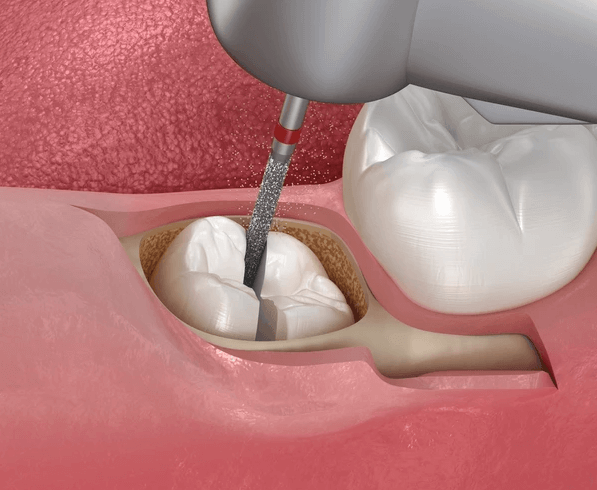
What Is Coronectomy?
A Coronectomy is a specialized dental procedure designed to manage impacted wisdom teeth while minimizing the risk of complications. Unlike traditional wisdom tooth extraction, where the entire tooth is removed, a coronectomy involves only the removal of the crown (the visible part of the tooth), leaving the roots safely in place beneath the gum line. This approach is particularly beneficial when wisdom teeth are positioned close to important structures like nerves or sinuses, which can be at risk during extraction. Coronectomy reduces the likelihood of nerve damage, sinus complications, and other potential issues associated with full tooth extraction.
If you’re considering a coronectomy, there are some things you should know:
- Who Should Consider Coronectomy?
- Benefits Of Coronectomy
- Alternative Treatments To Coronectomy
- How Much Does Coronectomy Cost?
- Steps In The Coronectomy Procedure
- Frequently Asked Questions About Coronectomy
If you have any further questions about Coronectomy or other dental services offered at Atlas Dental, please contact us.

Free phone consultation
Have questions about Coronectomy? Book a free phone consult with our Toronto dental clinic

5 star google reviews
See for yourself why more and more people are choosing Atlas Dental for same day Coronectomy

Book Wisdom Teeth Removal Online
Have wisdom tooth pain in Toronto and need an appointment? Call our dental office for same day Coronectomy
Who Should Consider Coronectomy?
Coronectomy is typically recommended for individuals with impacted wisdom teeth that are close to sensitive structures. Some common reasons for choosing a coronectomy include:
- Impacted Wisdom Teeth: When wisdom teeth are trapped beneath the gum, causing pain, infection, or damage to nearby teeth.
- Nerve Proximity: If a wisdom tooth is located near the inferior alveolar or lingual nerves, coronectomy minimizes the risk of permanent nerve injury.
- Sinus Complications: Wisdom teeth positioned close to the sinuses pose a risk of sinus perforation during extraction, which coronectomy helps avoid.
- High-Risk Patients: For patients with certain medical conditions or unusual anatomy, coronectomy offers a less invasive approach, reducing potential complications.
By addressing these specific situations, coronectomy provides a tailored solution for individuals who may not be suitable candidates for traditional wisdom tooth extraction due to the potential risks involved. If you have further questions about Coronectomy, please contact us.
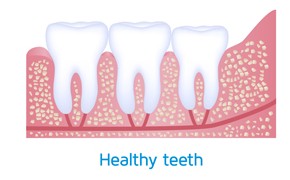
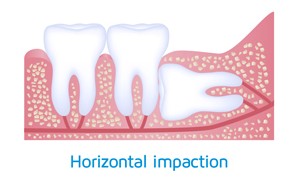
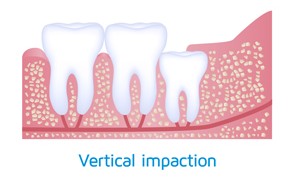
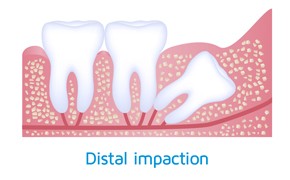
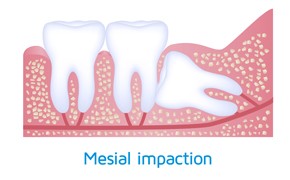
Benefits Of Coronectomy
Coronectomy offers several distinct advantages over full tooth extraction, particularly for high-risk patients:
- Preservation of Vital Structures: By leaving the tooth roots intact, coronectomy reduces the risk of damage to nerves, sinuses, and surrounding teeth.
- Lower Risk of Nerve Damage: In cases where wisdom teeth are close to major nerves, coronectomy significantly reduces the chance of permanent numbness or sensory loss.
- Reduced Dry Socket Risk: Unlike traditional extraction, coronectomy results in less trauma to the surrounding tissues, decreasing the likelihood of dry socket—a painful condition that occurs when a blood clot fails to form at the extraction site.
- Faster Recovery: Patients generally experience less pain and swelling after a coronectomy, leading to quicker recovery times and a faster return to normal activities.
By prioritizing the preservation of vital structures and promoting faster healing, coronectomy offers a conservative yet effective approach to addressing problematic wisdom teeth. If you have further questions about Coronectomy, please contact us.
Alternative Treatments To Coronectomy
If a coronectomy is not the best option for you, other treatments may be considered:
- Traditional Wisdom Tooth Extraction: This involves removing the entire tooth, including the roots. While effective, it carries a higher risk of complications such as nerve damage and sinus issues, especially if the tooth is close to critical structures.
- Monitoring (Watchful Waiting): In cases where wisdom teeth aren’t currently causing problems, a dentist may recommend regular monitoring. This option avoids surgery but comes with the risk of future complications, like infection or damage to nearby teeth.
- Referral to a Specialist: If you have complex needs or are at high risk for complications, your dentist may refer you to an oral surgeon for a more detailed evaluation and treatment plan.
Each treatment option comes with its own risks and benefits. It’s important to discuss these with your dentist to determine the most appropriate approach for your specific situation. If you have further questions about Coronectomy, please contact us.
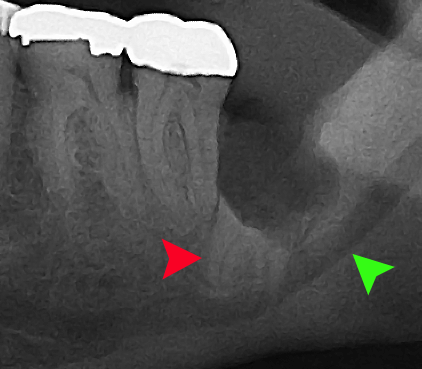
Cost of Coronectomy
Coronectomy costs $684 per tooth. The codes relevant to a Coronectomy in the Ontario Dental Association’s Suggested Fee Guide appear as follows:
Coronectomy, Intentional Partial Removal
- 72242 – Coronectomy (Deliberate Vital Root Retention to Prevent the Complications Associated with an Extraction): $684
Coronectomy is considered a basic service under all dental insurance plans and should be covered to your maximum insurable limit, but be sure to find out from your dental insurance plan provider how much you are eligible for before going ahead with dental treatment. Our fees are consistent with the ODA Fee Guide.
For patients without dental insurance, Atlas Dental is pleased to offer dental financing through iFinance Dentalcard. Affordable payment plans start at 7.95% for terms of 6 months to 6 years. To learn more about Dentalcard dental treatment financing, follow this link.
Steps In The Coronectomy Procedure
A coronectomy is a safe and effective procedure when performed by an experienced dental professional. Here’s what to expect:
- Preoperative Assessment: Your dentist or oral surgeon will take a panoramic x-ray or CBCT scan to evaluate the position of the impacted tooth and its proximity to nerves or sinuses.
- Anesthesia: Local anesthesia will numb the area, and sedation options may be available for patients who are anxious or uncomfortable.
- Crown Removal: The dentist carefully removes the crown portion of the tooth while leaving the roots intact. This helps minimize trauma to nearby structures.
- Suturing and Healing: Once the crown is removed, the site is sutured, and any bleeding is controlled. Post-operative instructions will be provided to ensure proper healing.
- Follow-Up Care: A follow-up visit will be scheduled to monitor healing, remove stitches if necessary, and address any concerns.
By leaving the roots in place, coronectomy ensures minimal risk of nerve injury, sinus problems, or other complications, allowing for a smooth recovery. If you have further questions about Coronectomy, please contact us.
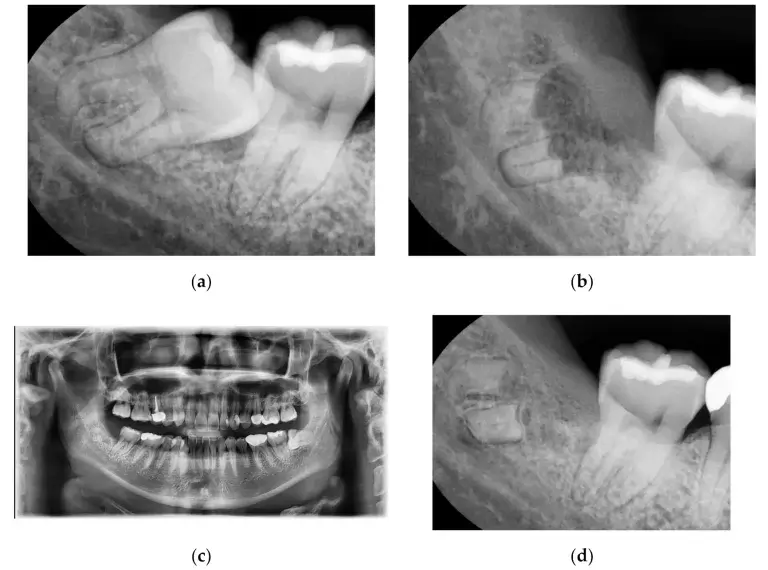
Frequently Asked Questions About Coronectomy
- What is the recovery time after a coronectomy?
Recovery is usually faster than traditional extraction, with reduced pain and swelling, typically resolving within a week.
- Does leaving the roots behind cause future problems?
In most cases, the roots remain stable and do not cause issues. Your dentist will monitor them during routine check-ups.
- Can a coronectomy be performed on any tooth?
Coronectomy is primarily used for wisdom teeth; it’s rarely performed on other teeth.
- Is a coronectomy safer than a full extraction?
Yes, it reduces risks of nerve injury, sinus perforation, and other complications associated with traditional wisdom tooth extraction.
A coronectomy is a safe and effective option for managing impacted wisdom teeth while minimizing risks to surrounding structures. If you have further questions about Coronectomy, please contact us.

